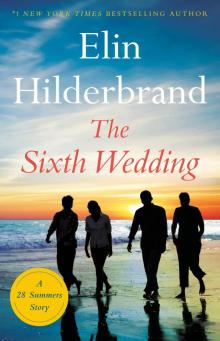- Home
- Elin Hilderbrand
Troubles in Paradise Page 5
Troubles in Paradise Read online
Page 5
This gets a smile, though one so fleeting that Huck wonders if he imagined it. “I don’t want to be a charity case. And I don’t want to feel like I owe you something in exchange for…”
Huck exhales a stream of smoke. Now he’s offended. “Please, Irene. Give me some credit.”
“I do, but…”
“But you were married to a fella for thirty-five years who turned out to be a cheat and a liar and a criminal,” Huck says. “So I understand how maybe you’re hesitant to trust the very next man you meet. But I promise—Irene, I promise you on my precious granddaughter’s life that I am pure in my intentions and my feelings. I’ve been hurt before too. Hurt badly.” Huck pauses. At some point, he’ll tell her the story about Kimberly, and she’ll understand they’re more alike than she knows. “I’m not going to use kindness to leverage something from you. Do you understand me?”
“Yes.”
Are we okay, then? he wants to ask. Irene steps toward him and puts her hands on his shoulders, then moves closer and clasps her hands behind his neck. She rests her head on his chest.
Two things are apparent in that moment. One, they are okay. And two, Huck doesn’t understand women.
Irene’s phone rings, snapping them back to reality. Happiness is a butterfly that lands and then just as quickly flies away.
Irene answers the phone. “Hello?” There’s a pause. “Oh, Baker.” Another pause. “What? Where are you? Here? On St. John?” She turns to Huck, her eyes wide with alarm, and mouths: He’s here.
Huck stubs out his cigarette. He imagines his buddy Rupert doing his best Chief Brody imitation: Huck, my friend, you’re going to need a bigger boat.
Ayers
Treasure Island has a blown powerhead. It needs to go all the way to Puerto Rico to be worked on and won’t be back in commission for a week.
Ayers is relieved. As usual, she wakes up facedown on her bed at the crack of dawn when her coffeemaker starts gurgling, but Ayers can barely even lift her head. She has to go to the bathroom but it’s ten feet away, which might as well be a country mile.
Depression is setting in. Because of Mick.
Fool me once, shame on you.
Fool me twice, shame on me.
After Maia called to tell Ayers that she saw Mick and Brigid kissing on the beach—They were all over each other, I saw it with my own two eyes—Ayers nearly smashed her phone against the tile floor of her apartment. But she was stopped by her pragmatism (it would take seven hundred and fifty dollars and a trip to St. Thomas to replace it) and her skepticism. Maia must be mistaken. She’d thought it was Mick and Brigid, but it had to be another couple.
Mick had proposed only two days before. He’d planned the whole thing, luring Ayers out onto his boss’s boat, Funday, rafting up in Christmas Cove near Pizza Pi among all their friends in the St. John service industry, asking Captain Stephen from the Singing Dog to play “Southern Cross,” which was Ayers’s favorite song. My love is an anchor tied to you, tied with a silver chain. He’d proposed in front of everyone, but aside from that, Ayers couldn’t have executed it better herself. And maybe part of her did appreciate the public nature of the proposal. All of their friends knew that Mick had cheated on Ayers with Brigid and had then dated Brigid for two months, one week, and three days. (Yes, it was painful enough that Ayers kept track.) So it was validating to have everyone bear witness to Mick’s ultimate choice.
It was Ayers. Ayers, not Brigid.
Or so she’d thought.
She wanted to dismiss what Maia had told her. Maia was only twelve. Could she really be trusted?
But Ayers trusted Maia more than anyone else she knew. Maia wouldn’t have said it was Mick and Brigid unless it was Mick and Brigid. Ayers had to admit that Mick kissing Brigid on the beach wasn’t out of the realm of possibility. She could only too easily imagine how it had unfolded. Brigid wanted “closure,” she needed to have “a talk,” she “deserved at least that.” And then she gazed at him a certain way or she nudged her knee between his legs or she stroked his earlobe—and Mick broke. Mick might have thought that since he’d proposed and would be with Ayers the rest of his life, he had one last pass.
He did not have one last pass.
Ayers had decided to verify Maia’s sighting with a second source. She’d texted Lindsay, another server at the Beach Bar, someone she considered a friend, to ask if she’d noticed Mick and Brigid slip away during service.
The response: TBH, yes, B. stranded me tonight with all her tables for…half an hour? She’s been crying since Monday, and I assumed Mick was going to talk with her about it because it’s been distracting for all of us. But they were gone an unusually long time and when they came back, B. looked much happier.
Ayers pulled the ring off her finger and nestled it back into its little velvet box. She wondered about the happy bride-to-be who would eventually wear it.
She sent Mick a text: I know you kissed Brigid. I’m leaving the ring in the box under the big rock at the end of my driveway.
Mick texted back: K.
K? Ayers thought. What kind of response was that? Didn’t he want to know how Ayers had found out? Didn’t he want to try and deny it? Wasn’t he going to fight for her?
Apparently not.
The engagement was over; it had lasted slightly more than forty-eight hours. Ayers should never have taken Mick back. Brigid was some kind of narcotic for him.
She sent a second text: Best of luck to you two.
She wanted to say something else, but You deserve each other was too cliché and Just remember—once a slut, always a slut seemed too mean. In the end, Ayers wrote, Poor Gordon. Because Ayers felt sorry for Mick’s dog. She’d miss him.
And then Ayers had texted Baker to let him know what was up. Maia saw Mick kissing Brigid on the beach tonight. I’m giving the ring back.
Baker responded: Can’t wait to celebrate your newfound freedom!
Ayers is so tired. She’s flattened. She lies in bed until three thirty, which is the last possible moment she can get up and make it to La Tapa on time, but she still can’t muster the energy to move. She picks up her phone—there’s no word from Mick, or from Baker either, for that matter—and calls La Tapa.
Tilda answers.
“Til,” Ayers says. “I can’t make it in tonight. I know it’s trash of me to bag on you so late but honestly…” Honestly, the mere idea of lifting trays, opening wine, remembering orders—nope, it’s beyond her today.
“Don’t worry about it,” Tilda says. “We have only thirty on the books. Besides”—here, Tilda lowers her voice—“we all know what happened with Mick.”
“You do?” Ayers says. She’s not sure why she’s surprised; it’s a tiny island, the coconut telegraph and all that. Brigid is probably crowing about her triumph all around town. Ayers wonders if Mick came by to get the ring. Maybe he gave her ring to Brigid; he is just enough of a cheeseball to do exactly that.
“Yeah, he’s staging a sit-in at Cruz Bay Landing. Him and Gordon.”
“A what?”
“He’s been at the bar at CBL since it opened this morning. He has the ring in front of him. He’s stinking drunk and he claims he’s not moving until you take him back. Gordon is tied to his bar stool.”
“You’re kidding me,” Ayers says.
“Not kidding, saw it myself,” Tilda says. “I think AK is going to cut him off soon, but he might have to call the police to get Mick out of there.”
Ayers is slightly revived by the news that Mick is staging a sit-in at Cruz Bay Landing, crying into his beer. So he is upset after all.
“He gave me this whole song and dance about how Brigid was taking a new job at Island Abodes, something he arranged to get her away from him. And not two days later, they’re making out on the beach. I don’t care if he sits at CBL for the rest of his life, I don’t care if he turns into petrified wood and moss grows on him and a bird builds a nest in his hair, I’m not taking him back.”
“Good
girl,” Tilda says. “You’re on the schedule Saturday night. I’ll see you then?”
“Yes,” Ayers says. “Thanks, Til.”
Thursday passes in a blur. Friday comes and Ayers doesn’t feel any better. She feels worse—dull, leaden, sluggish, and dizzy. Her coffee tastes sour; food holds no appeal. She doesn’t have to work at La Tapa but she’s supposed to hang out with Maia in the afternoon.
She can’t imagine getting in her truck and driving to Gifft Hill, much less doing some kind of fun, enriching activity. Waterlemon—they were supposed to snorkel at Waterlemon. If Ayers tried to snorkel, she would end up sleeping on the sandy floor of the Caribbean.
She sends Maia a text even though Maia is at school and (technically) not allowed to check her phone: I can’t pick you up, Nut. I’m sick.
Two seconds later (so much for the rules), there’s a response: It’s okay, I’m grounded anyway, plus there’s been drama at home.
Drama? Ayers texts. At home meaning with Huck? This is unusual.
Too much to text, Maia says. Call me later.
Later is Saturday at noon. It takes everything Ayers has to get out of bed, take a shower (her hair is in the first stages of dreadlocks), and make herself eat a piece of toast at her tiny kitchen table. She fights to keep the toast down. Something is up with her; this isn’t just emotional distress. After all, Ayers hiked the Reef Bay Trail only two days after Rosie died.
Ayers checks her arms and legs, praying that she has overlooked some kind of weird bite or sting that would explain this. She’d gone backpacking all over the world with her parents when she was growing up, and she’d witnessed travelers in the throes of all kinds of exotic ailments. There was a pretty, blond college student doing a gap year in Nepal who nearly died of giardia, a couple of Israeli kids in India who had leishmaniasis that they thought they’d gotten from sand flies on Goa, and in Thailand, they’d met a family who had been infested with sea lice.
Leptospirosis? A guy Ayers knows down here contracted that from cleaning palm rats out of traps.
Ayers is making herself sicker just thinking about this. Stop thinking about it! She texts Maia. You busy?
A second later, Ayers’s phone rings; her screen says Nut and lights up with a picture of Maia at Carnival a few years ago, her face painted royal blue and crimson.
“Hi,” Ayers says. “Whatcha doin’?”
“Decorating my new room,” Maia says. “Or, as Gramps calls it, ‘moving the mess.’”
“New room? Are you…”
“Taking Mama’s room,” Maia says. “I’ve slept in here the past two nights.” She pauses. “The sheets still smell like her. How long do you think that will last?”
Ayers’s heart feels like a dying rose shedding its petals. “Oh, Nut,” she says.
“I worry I’m gonna make the smell disappear faster by sleeping in the bed and that one night it won’t smell like her, it will smell like me. But I don’t have a choice because Irene is sleeping in my room.”
“Irene?”
“Yeah,” Maia says. “Have you not heard? Baker didn’t call you?”
Baker has not called her, which she finds strange, since he’s supposedly so keen on celebrating her “newfound freedom,” but she figures he’s been busy getting settled in, and, frankly, she’s relieved that he hasn’t asked to see her. “No,” Ayers says. “Heard what?”
Maia sighs like an adult. “Well, they lost the villa in Little Cinnamon.”
This news propels Ayers out of her chair and over to the front window. It’s another beautiful day in paradise; things are happening out there while Ayers convalesces. “Lost the…lost the villa? What are you talking about?”
“Gramps said it was tax trouble. But I heard him and Irene talking about the FBI. I think my dad was into something illegal.”
Ayers’s stomach lurches. She collapses onto the sofa. Hidden underneath it are all of Rosie’s journals. Ayers had discovered the journals buried in Rosie’s dresser and she’d…absconded with them, taking them from Huck’s house. They were Ayers’s own private archaeological find, no less precious or revelatory to Ayers than the Dead Sea Scrolls or dinosaur bones. These journals told Rosie’s story, one Ayers didn’t know, and Ayers was Rosie’s best friend. Ayers found herself compelled to binge on them but she’d made herself read slowly and carefully. She’d made herself savor them.
In the final two volumes are passages in which Rosie described Russ telling her outright back in 2016 that his company, Ascension, sold the lots in Little Cinnamon to fictional entities—shell companies. He admitted to Rosie that Ascension was in the business of hiding money, laundering money. And then, in the very last pages of the journal, Rosie wrote about how Russ had informed his boss, Todd Croft, that he was leaving the company and how Todd Croft had shown up at La Tapa and threatened Rosie.
Six weeks later, both Russ and Rosie were dead.
Now the FBI knows and the villa is gone? Ayers’s thoughts are all over the place. Do the FBI agents think Todd Croft killed Russ and Rosie, or do they think it was, in fact, a lightning strike? Ayers remembered hearing thunder that morning. So it was a lightning strike—simple, impossible bad luck. But the scene Rosie described with Todd Croft was…alarming.
The villa is gone.
Ayers can’t help but wonder what this means for Baker. Obviously, if there’s no place for him to live, then he’s going back to Houston.
Ayers feels a deep, crushing disappointment, worse even than her pain about the broken engagement. Baker will leave—if he even arrived in the first place. And what about Cash? Will he leave too?
Ayers brings her mind back to the present. “So Irene is living with you guys?” she says. “For how long?”
“Until she gets back on her feet,” Maia says. She lowers her voice. “I think Gramps is happy. He cut my grounding down to a week.”
“Won’t Irene go back to Iowa?”
“She can’t,” Maia says. “The FBI took that house too.”
“You’re kidding.”
“I told you, there’s been drama.”
“What about Cash?” Ayers says. Because Treasure Island is out of commission, Ayers hasn’t spoken to Cash since Tuesday night. “Is he staying with you guys?”
“He’s living with Tilda,” Maia says.
Living with Tilda? Ayers knew they were kind of seeing each other; they’d been together the afternoon that Mick proposed at Christmas Cove. That was five days ago. Now they’re living together? “Wow,” Ayers says. The toast won’t settle in her stomach; she feels like it’s on a seesaw. Is it coming up or staying down? “Where’s Baker?”
“He and Floyd are at the Westin,” Maia says. “I’m actually headed there in a little while to watch Floyd while Baker looks at some rentals.”
“You are?” Ayers says. She feels a tiny arrow of optimism shoot through her, though she’s too lethargic to even smile. “So they’re staying?”
“Yes, they’re staying. Floyd starts at Gifft Hill on Monday,” Maia says. “Wait until I tell everyone he’s my nephew.”
Oh, boy, Ayers thinks. The Gifft Hill mothers will have a field day with that. “Have fun,” Ayers says. “I love you; you’re my number-one girl. Let’s hang out next week.”
“We can…” Maia says. “But I might be busy with my friends or babysitting for Floyd.”
“Right,” Ayers says. “Only if you can fit me in.”
“I’ll have my people call your people,” Maia says, and she hangs up.
Baker is staying! For a second, Ayers’s happiness is greater than the dread that she feels about the rest of the story—the lost villa, the FBI, Russ’s illegal business dealings.
She should tell someone about the journals; it feels like they’re smoldering beneath her. But…they’re personal, private. Rosie wouldn’t want anyone to see them, of that Ayers is certain. Ayers plans to give them to Maia when she gets older.
The FBI knows Russ was laundering money, so the journals wouldn’t offer a
nything new. But what about the mentions of Todd Croft? Was there foul play with the helicopter?
Argh! Ayers doesn’t want to hand the journals over. It’s her own private line of communication with Rosie. And if Huck read them, or, worse, Irene read them—well, that wouldn’t be good. And yet to hide them…no, Ayers has to show someone.
She’ll show Huck. Or Baker? No, Huck.
I’m sorry, Rosie, Ayers thinks—and then she races to the bathroom to throw up.
Cash
I’m sure you understand my concerns,” Granger Payne says.
Before Cash can respond, Granger dives into the T-shaped pool and powers out six laps. Then he lifts himself out of the pool, triceps flexing, and dries his face with one of the fluffy white Turkish towels. Over the past week, Cash has become very familiar with all the luxuries on offer here at Tilda’s parents’ house in Peter Bay.
Which is precisely Granger’s point.
“I do indeed, sir,” Cash says. He’s relieved that the Treasure Island is back up and running and that he’s dressed for work. Every day for the past few days, while the boat was being repaired, Cash woke up late with Tilda, and over banana pancakes and mango smoothies, they picked a beach or a trail or both to hike. On Tilda’s day off, the two of them climbed into Tilda’s Range Rover and drove out to Hansen Bay in the East End. They rented a kayak and spent the entire afternoon drinking grapefruit margaritas and eating the sublime tacos—rum rib with chipotle slaw, green chicken curry—at the floating-barge restaurant Lime Out. Lime Out had bar seats attached to the barge, which Cash and Tilda sat in before claiming a floating table. They reclined on inflatable chaises, faces to the sun, drinks in hand, toasting the good life, which they were undeniably enjoying. Cash had to actively fight off encroaching guilt. His family had just undergone a huge financial crisis and what was Cash doing? Drinking cocktails that his brand-new girlfriend was paying for with her black American Express card.

 What Happens in Paradise
What Happens in Paradise Reunion Beach
Reunion Beach The Sixth Wedding
The Sixth Wedding 28 Summers
28 Summers Summer of '79: A Summer of '69 Story
Summer of '79: A Summer of '69 Story Troubles in Paradise
Troubles in Paradise The Perfect Couple
The Perfect Couple Winter Solstice
Winter Solstice Barefoot: A Novel
Barefoot: A Novel